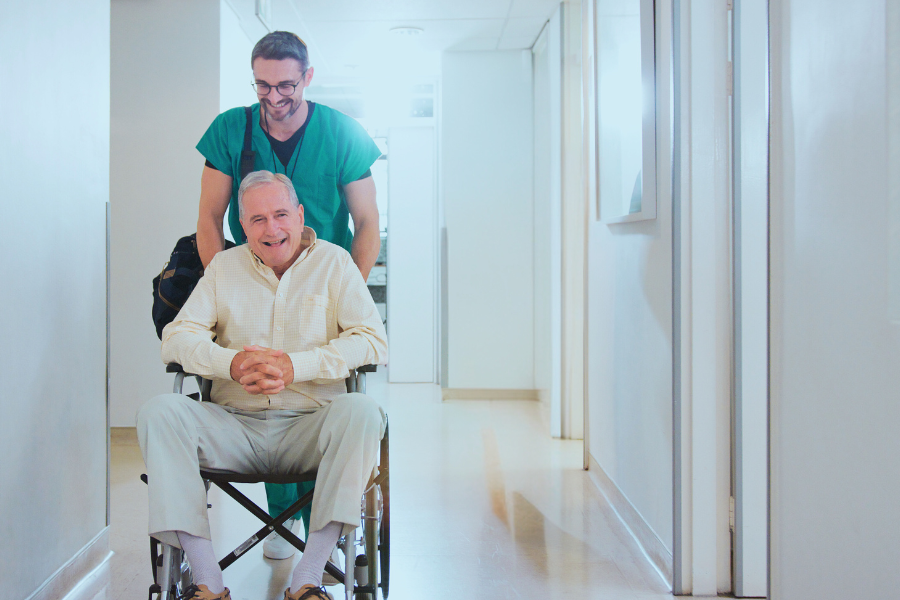When a loved one is discharged from the hospital or a skilled nursing facility, their recovery often requires extra support at home to ensure a safe, comfortable, and effective healing process. Families may choose to bring in home care (non-medical) or home health care (medical) services, or even a combination of both, depending on their loved one’s needs.
Home care offers non-medical assistance such as help with daily activities, meal preparation, medication reminders, and companionship, typically provided on a flexible schedule that can range from a few hours per day to 24/7 care. This option is ideal for those who need consistent support but do not require medical interventions.
Home health care, on the other hand, involves licensed medical professionals who manage clinical needs, such as wound care, physical therapy, and monitoring of vital signs. Often prescribed by a doctor, home health care usually involves scheduled visits of just a few hours per week, focusing on specific medical recovery goals. By integrating both types of care, families can ensure their loved ones receive comprehensive, personalized support for a more seamless and secure recovery journey.
Those most at risk for readmission after hospitalization or skilled nursing stays may benefit significantly from the additional support home care offers to help prevent setbacks and support a safe recovery.
- Older Adults with Mobility Challenges: Increased risk of falls and difficulty managing daily activities alone.
- Patients with Chronic Conditions: Conditions like heart disease, diabetes, or COPD often require consistent monitoring and management.
- Individuals Recovering from Major Surgery: Post-operative care needs, including wound management and physical support, are crucial for healing.
- Those with Cognitive Impairments: Patients with dementia or memory issues benefit from assistance with routines, medications, and safety.
- Patients with Complex Medication Regimens: Those who need help managing multiple medications to ensure adherence and prevent complications.
- Individuals Living Alone: Without regular family support, these patients may struggle to maintain a safe and stable recovery environment.
Adding home care can provide these high-risk individuals with the consistent support they need to reduce readmission risks and support a smoother recovery. In summary, in home care offers:
- Customized Recovery: Each recovery is unique. Home care adapts to individual needs, covering essentials like meal prep, medication assistance, and daily tasks.
- Safety as a Priority: Falls are a serious concern among seniors. Home caregivers help reduce these risks, offering steady support and a safe home environment.
- Promotes Faster Healing: Home care reduces the chance of hospital readmission by 40% after surgery, paving the way for a smoother recovery.
Smooth Transition Home: Day-One Support
The transition home can feel overwhelming, but home care simplifies this process with:
- Home Safety Prep: Caregivers clear pathways and make adjustments to reduce fall risks.
- Hospital Transport and Comfort: Assistance from discharge to settling in at home.
- Complication Monitoring: Observing new routines and addressing early signs of issues, creating a secure transition.
Reducing Hospital Readmissions: Prevention First
Returning to the hospital is stressful and common for 20% of seniors within 30 days of discharge. Home care helps prevent setbacks with:
- Monitoring & Medication Management: Keeping track of medications and spotting early warning signs.
- Fall Prevention Strategies: Identifying and removing hazards, and providing physical support.
- Follow up Appointments: Adding in care coordination to make sure appointments are scheduled and attended helps the healing process. Home care can help clients navigate the complexities of their medical plan.
Holistic Support: Body, Mind, and Spirit
Healing isn’t just physical. Home care supports emotional well-being too, easing isolation and providing companionship.
- Patient Preference: 70% of patients feel more comfortable and recover better at home with caregiver support.
- Social Interaction: Caregivers engage patients in activities, conversation, and routines that enhance mental and emotional health.
Personalized, Flexible Care Plans
Care needs vary, and home care agencies offer part-time to 24/7 support, with services tailored to each patient’s unique journey.
- Adaptable Schedules: Hourly or full-time options to suit family needs.
- Specialized Plans: Including support for physical therapy, dietary management, and tailored recovery goals.
Peace of Mind for Families: Quality Time Together
Home care takes on the caregiving details, allowing families to focus on quality time rather than constant worry.
- Professional Management: Caregivers handle emergencies, daily routines, and keep families updated, making recovery less stressful for everyone.
Key Benefits at a Glance
- 40% Fewer Readmissions: A significant reduction for post-surgery patients.
- 36 Million Falls Annually: Caregivers help reduce this risk, promoting safe movement at home.
- 70% Prefer Home Recovery: Patients heal better surrounded by loved ones with the help of caregivers.
Hiring home care after a hospital stay offers compassionate, skilled support, making recovery safer, smoother, and more comfortable.

